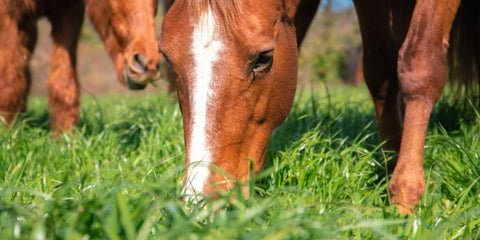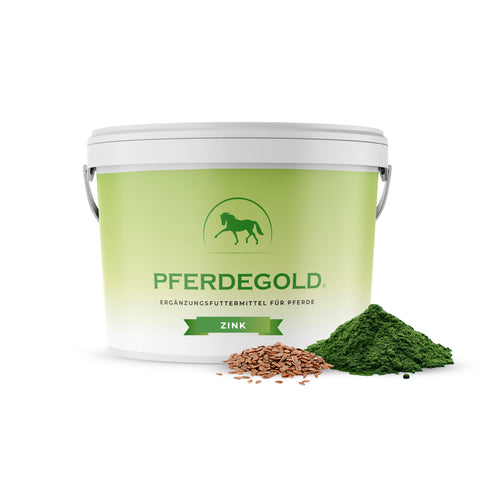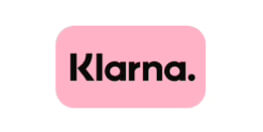
Florian ist aufgewachsen auf einem Bauernhof. Umgeben von Pferden, entdeckte er früh seine Faszination für diese majestätischen Tiere. Inspiriert von seiner reitbegeisterten Mutter, entwickelte er das Nahrungsergänzungmittel - Pferdegold. Seine tiefe Verbundenheit zur Natur und die leidenschaftliche Hingabe zu Pferden trieben ihn an, sein Unternehmen zu gründen.
Zinc in horses: Identify zinc deficiency and provide optimal care
Is your horse suffering from brittle hooves , poor coat quality, or frequent infections ? A zinc deficiency could be the cause ! Zinc is one of the most important trace elements for horses , but it is often underestimated. In this article, you'll learn everything about the functions of zinc in horses, how to recognize a zinc deficiency, and how to optimally supply your horse with this essential trace element.

Healthy horse with shiny coat: Zinc for optimal skin and coat health
What is zinc and why is it so important?
Zinc for horses is an essential trace element that the horse's body cannot produce itself. It is involved in over 300 enzymatic reactions and plays a central role in virtually all bodily functions. No other trace element has such a direct impact on horse health.
🧠 The most important functions of zinc:
Immune system and defenses:
Zinc in horses is the engine of the immune system. It activates immune cells, supports antibody production, and provides a strong defense against bacteria, viruses, and fungi. Without sufficient zinc for horses, the animals are more susceptible to infections and diseases.
Skin and coat health:
Zinc is essential for cell renewal and wound healing in horses. It ensures healthy, elastic skin and a shiny, dense coat . A zinc deficiency in horses leads to flaky skin, dull coat, and poor wound healing.
Hoof and horn quality:
Horn formation in horses is impossible without zinc. It ensures strong, elastic hooves and healthy horn growth. Zinc deficiency causes horse hooves to become brittle, cracked, and grow poorly.
Metabolism and hormones:
Zinc for horses regulates carbohydrate, protein, and fat metabolism. It is involved in insulin production and influences important hormones such as growth hormone and sex hormones.
Zinc deficiency in horses: causes and risk factors
Zinc deficiency in horses is widespread. Studies show that up to 70% of all horses are not optimally supplied with this important trace element. The causes of zinc deficiency in horse husbandry are diverse and often interrelated.
Soils that are low in zinc produce hay and grass that are low in zinc. Furthermore, intensive agriculture depletes the soil.
High levels of calcium, iron and phosphorus in the feed inhibit zinc absorption, as does poor feed quality or one-sided feeding.
Foals and young horses during growth, mares during pregnancy and lactation and horses undergoing intensive training or competition have an increased need .
But also Horses have an increased need for zinc when they are stressed due to changes in housing or transport, when they are shedding their coat or when they are ill.
💡 Did you know?
Zinc is excreted in greater quantities during stress and physical exertion! Sport horses and stressed horses therefore have a significantly higher zinc requirement than leisure horses kept at rest.
Zinc is especially valuable during the shedding season: Shedding is a tremendous effort for the horse's body. The old coat must be shed and new, healthy hair must be formed. Horses need a particularly high level of zinc during this time, as it is essential for keratin (hair protein) synthesis. Supplementing horses with zinc during shedding supports a smooth transition and ensures a shiny, healthy new coat.
Detecting zinc deficiency: correctly interpreting warning signs
The signs of zinc deficiency in horses usually develop gradually and are often overlooked. Early detection is crucial, as the symptoms of zinc deficiency worsen with persistent deficiency.
🚨 Typical signs of zinc deficiency:
Skin and fur:
- Dull, lackluster coat
- Flaky or dry skin
- Itching and skin irritations
- Poor wound healing
- Eczema or skin fungus
Hooves and horn:
- Brittle, cracked hooves
- Poor horn growth
- Loose wall or sole bleeding
- Frequent hoof rot or frog rot
Immune system:
- Frequent respiratory infections
- Longer duration of illness
- Poor vaccination response
- Susceptibility to fungal infections
General well-being:
- Performance loss without any identifiable cause
- Delayed regeneration after training
- Loss of appetite
- Poor feed utilization

Horse's hoof is examined - zinc is important for hoof quality
Diagnosing zinc deficiency in horses
A blood test at the veterinarian can provide information about zinc status. However, the blood test only shows the horse's acute zinc supply, not its long-term storage situation.
A more meaningful combination of clinical symptoms (see above), feeding analysis of the current ration and test supplementation and observation of improvement
Zinc requirements in horses: How much zinc do horses need?
A horse's zinc requirements vary depending on size, weight, performance, and living conditions. Adequate zinc intake for horses is the foundation for health and well-being.
📏 Daily requirement according to horse size:
Maintenance requirements (preservation):
- Small horse (300kg) : 300-400mg zinc daily
- Large horse (500kg) : 500-600mg zinc daily
-
Cold-blooded horses (700kg) 700-800mg magnesium daily
Increased demand for:
- Sport horses: +30-50% more
- Pregnant mares : +25-30% more
- Lactating mares: +40-60% more
- Young, growing horses: +30-40% more
- Stressed or sick horses: individually adapted
Guidelines for practice:
- Leisure horse (500kg): 500-600mg zinc/day
-
Sport horse (500kg): 2650-800mg zinc/day
- High performance horse (500kg): 800-1000mg zinc/day

Horse eats hay - zinc usually has to be fed additionally
Zinc sources: Natural supply vs. targeted zinc supplementation
The horse's zinc supply comes mainly from basic feed (hay, grass) and concentrated feed. In many cases, however, this is not enough to fully cover the horse's zinc requirements.
🌱 Natural sources of zinc:
Forage:
- High-quality hay: 20-40mg zinc/kg (varies greatly)
- Fresh grass: 15-50mg zinc/kg (seasonal)
-
Alfalfa/Sainfoin: higher levels than grass
Concentrated feed:
-
- Oats: 25-35mg zinc/kg
- Barley: 20-30mg zinc/kg
- Wheat bran: 60-80mg zinc/kg
The problem: Zinc levels in horse feed vary greatly depending on soil quality, fertilization, and harvest time. It is often impossible to provide a horse with sufficient zinc through forage alone.
💊 Targeted zinc supplementation:
If the basic feed is insufficient , horses require targeted zinc supplementation . Different zinc compounds are distinguished:
Zinc oxide:
- High zinc content (80%)
- not recommended as a sole source of zinc, but ideal as a supplement to organic forms of zinc
Zinc sulfate:
- Good bioavailability and proven efficacy
- Rapid absorption in the intestine
Zinc chelate (zinc glycinate):
- Best recording and utilization
- Zinc content approx. 20%
💡 Pro tip: Why combine different sources of zinc?
The Combination of several zinc compounds is particularly effective because they use different absorption routes in the intestine. While organic forms of zinc, such as zinc chelate, offer optimal bioavailability for horses, inorganic forms supplement the horse's overall zinc intake, ensuring a consistent and complete supply throughout the day.

High-quality zinc should consist of various zinc sources
The optimal supply with Pferdegold Zinc:
✅ High-quality zinc combination
Optimal bioavailability for best absorption and utilization
✅ Dosage as needed
Precisely tailored to the daily zinc requirements of horses
✅ Monopreparation without additives
Concentration on the most important mineral - without unnecessary fillers
✅ Made in Germany
Highest quality standards and strict controls
✅ Grain-free & doping-free
Safe for all horses, including sport and competition horses
✅ 30-day money-back guarantee
Test risk-free and convince yourself of the effect
⚠️ Important note: Pferdegold Zinc is not related to the symptoms or diseases described in this article. It does not treat any diseases and is not a substitute for veterinary diagnosis or treatment. This supplement can only be used as preventative support in healthy horses.

Pferdegold® Zinc
This specially developed supplement provides triple the zinc power and a fast and long-lasting zinc supply. Made in Germany, grain-free, and with a 30-day money-back guarantee.
Order nowApplication and dosage
The recommended daily dose is one scoop per day for a small horse and two scoops per day for a large horse (over 600 kg). For increased needs, consult your veterinarian.
🌱 Feeding recommendation:
- Mix over the concentrate or give directly into the mouth
- Best in the morning for optimal absorption
- Continuous administration for lasting effect
⚖️ Dosage guidelines :
Gradual dosage:
- Week 1: Start with half dose
- Week 2: Increase to target dose
- From week 3: Give full dose continuously
🐴 Continuous administration vs. treatment :
- Continuous administration: In case of chronic deficiency or increased need
- Treatment: 4-6 weeks for acute problems, then a break
- Dosage as needed: During stressful times (coat change, training, illness, etc.)
⚠️ Important information on dosage
Avoid overdose: More than 2000mg daily can lead to symptoms of poisoning
Note interactions: High calcium or phosphorus doses reduce zinc absorption
Individual customization: If unsure, consult a veterinarian or feeding advisor

Horses that are adequately supplied with zinc have healthy skin and shiny coats
Frequently asked questions about zinc in horses
How quickly does a zinc supplement work?
The first improvements with zinc supplementation are usually visible after 4-6 weeks , as the body's reserves must first be replenished. For skin and coat problems caused by zinc deficiency in horses, it can take 8-12 weeks before significant improvements are noticeable.
Can you overdose on zinc?
Yes, an overdose is possible. More than 2000 mg daily can lead to symptoms of poisoning. However, at normal dosages, zinc is very safe.
When is the best time to give zinc to horses?
It is ideal to give zinc to horses in the morning with their concentrated feed , as absorption is best on an empty stomach. Zinc should not be given to horses together with calcium-rich feed.
Is zinc relevant for doping?
No, zinc is a natural trace element and not relevant for doping. It can be used safely in sport and competition horses.
How do I recognize high-quality zinc for horses?
High-quality zinc for horses contains various zinc compounds for optimal bioavailability, is free from harmful additives, and comes from controlled production with appropriate quality certificates.
Conclusion: Zinc in horses - The underestimated trace element for horse health
Zinc in horses is far more than just a trace element for a beautiful coat. It is an essential building block for health, the immune system, and performance . An optimal zinc supply for horses supports the immune system, skin and hoof health, and overall metabolism.
The most important findings:
- Zinc deficiency in horses is widespread and often overlooked. The symptoms develop gradually and range from skin problems to brittle hooves to frequent infections.
- Natural sources of zinc are often not sufficient, because the zinc content in horse feed varies greatly and many soils are zinc-poor.
- Targeted zinc supplementation for horses High-quality preparations such as Pferdegold® Zinc can close the supply gap and significantly improve well-being.
- The correct dosage and quality of zinc for horses are crucial - neither under- nor overdose leads to the desired result
Perfect for your horse: Pferdegold® supplementary feed!
These specially developed supplements support your horse's diet and provide it with natural nutrients. Made in Germany, grain-free and drug-free, they come with a 30-day money-back guarantee.
IMPORTANT:
Pferdegold is not a substitute for veterinary diagnosis or treatment. The information contained in this article is for general informational purposes only and is intended to help improve your horse's well-being.
Pferdegold Zinc is not related to any of the diseases described in this article. It does not treat any diseases and is not a substitute for veterinary diagnosis or treatment. This supplement can only be used as preventative support for healthy horses.
















